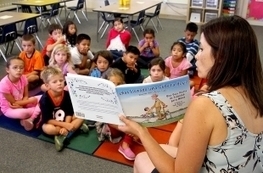 Your new post is loading...
Published by Palo Alto Online, August 21, 2015
One works on climate change in the White House. Another started a new job this week as an elementary school dual-immersion teacher. Another is a journalist; another is heading to Chile this fall for a physical therapy internship; and one now serves as program director for DreamCatchers, a local nonprofit that provides after-school tutoring and mentoring to low-income Palo Alto students. The common thread in these seemingly disparate career choices is Palo Alto Unified School District's Spanish immersion program, from which all of these people graduated from many years ago.
Published by the Amsterdan News, August 14, 2015
I grew up speaking Spanish with my parents, who fled their native Spain during its Civil War and settled in Brooklyn.
Published by Ischool News, July 29, 2015
A new study contradicted an old assumption that bilingualism is a hindrance in education as learning two languages at once would negatively impact learning and language development. Researchers discovered more grey matter in the brains of bilingual people than the average individual, which means they do better on tasks requiring short-term memory, attention, inhibition, or “executive control.”
Published by NBC News, June 13, 2015After all, it's my love of words -in both English and Spanish- that has led me to earn a Master's degree from Columbia and establish a career in journalism and communications. It even inspired me to pick up a third language - Italian - in college.
Sometimes, it takes years to come to terms and own our past experiences. I am happy to say I started as an ESL student, and I'm proud of all the languages I know.
Published by The Independent, May 1, 2015
"Bilinguals get all the perks. Better job prospects, a cognitive boost and even protection against dementia. Now new research shows that they can also view the world in different ways depending on the specific language they are operating in."

|
Scooped by
Dual Language Education of New Mexico
February 23, 2015 1:09 PM
|
Published by ABC News, February 22,2015
At Connecticut's casinos, the staff can speak to you in nearly any Asian language. At the Mohegan Elementary School, down the road from the Mohegan Sun casino, many of the casino workers' children are preparing for a celebration Wednesday of the Lunar New Year. A dragon parade, with puppets drawn by students in the English-learners program, will march before the student body as Chinese music plays over the loudspeakers. Chinese families account for about 20 percent of the student body, according to educator Lisanne Kaplan, who sees familiar faces among dealers and other workers when she visits the casino.

|
Scooped by
Dual Language Education of New Mexico
February 18, 2015 8:00 PM
|
Published by New America EdCentral, February 18, 2015
Conventional wisdom in the United States has almost always framed multilingualism as a disadvantage, one that hindered children’s academic and intellectual development and served as an obstacle to cultural assimilation. In 1998, California passed Proposition 227, which imposed wide-reaching restrictions on bilingual education, effectively banning it. Arizona and Massachusetts followed suit soon afterwards. Supporters of these bills insisted that English immersion instruction was the best, quickest way for English learners to learn English and succeed academically. Mainstream media coverage generally tracked the debate at the time and focused on the assumed downsides of diversity—the low achievement and high dropout rates of immigrant children and the additional costs of providing services in other languages.
However, in the years since these ballot measures, there’s been a mass of academic research suggesting that growing up multilingual has many advantages beyond being able to converse in more than one language. Recent studies and popular reports have shown that learning and developing in multiple languages confers distinct advantages to the developing brain. This new evidence also challenges the assumption that speaking a foreign language is an obstacle to assimilation.
Published by Oregonlive.com, February 8, 2015
For the class of 2014, Woodburn accomplished the state's best on-time graduation rate for Latino students, 88 percent, and the second-highest for students who learned English as a second language, 87 percent.
Published by the Sydney Morning Herald, January 13, 2015
Plenty of research has shown that learning a second language can boost brainpower, but a new study suggests that the effects extend to those who begin in middle childhood.
The study shows that people who began learning English around age 10 and were immersed in the language showed improvements in the structure of the brain's white matter.
That compares to people who grew up speaking only English and didn't learn a second language.
These "higher levels of structural integrity" were in areas responsible for language learning and semantic processing.
The findings mirror observations from previous studies that found these improvements in people who learnt a second language at a much earlier age.
The study was led by Christos Pliatsikas of the University of Kent school of psychology and published in the Proceedings of the National Academy of Sciences.

|
Scooped by
Dual Language Education of New Mexico
December 30, 2014 2:35 PM
|
Published by the Latin Post, December 8, 2014
Bilingual people are more efficient at higher-level brain functions.
New research suggests that those who speak two languages likely have the "bilingualism advantage," meaning that they're more efficient at language processing and other tasks.

|
Scooped by
Dual Language Education of New Mexico
December 27, 2014 11:21 AM
|
Published by WeAreOneAmerica, December 21, 2014
So much of the discussion on English language learners in U.S. schools focuses on what they don’t have (for example, academic English) or what they haven’t been able to do (such as graduate in rates comparable to proficient English speakers). These are real problems that deserve our attention.
But, sometimes it is important to turn around the conversation and talk about what English learners can do—most specifically, speak a language other than English. Yet, to grow from a young child who speaks one language at home to a fully bilingual and biliterate young adult requires an educational investment in developing both languages.

|
Scooped by
Dual Language Education of New Mexico
November 30, 2014 8:32 PM
|
Published by Inside Toronto, November 30, 2014
Toronto French Montessori School offers bilingual education for your children. By definition, multilingualism is the use of two or more languages by an individual. With many benefits in the future, there are a lot of advantages to exposing your child to more than one language for them, even during their schooling years.

|
Scooped by
Dual Language Education of New Mexico
November 12, 2014 6:11 AM
|
Published by Education Week, November 10, 2014
While foreign language requirements have long been a core requirement for high school graduation--second language classes at an earlier age would improve overall fluency for most students.
|
Published by the indian Panorama, August 21, 2015
I grew up speaking Spanish with my parents, who fled their native Spain during its Civil War and settled in Brooklyn. I didn’t know any English when I started kindergarten and the teacher marked me absent for six weeks because I didn’t understand her mangled pronunciation of my last name. Like many of you, I struggled to be bilingual and bicultural, trying to hold on to my parents’ traditions while finding my footing in their adopted land.
Published by the Toronto Sun, August 14, 2015
Polyglots are often assumed to be at an
advantage in the Canadian job market, but
Workopolis released a study that proves the
advantages of knowing a second or third
language — especially in Ontario.
Published by the National Journal, July 15, 2014
One in 10 students is classified as English Language Learners (ELLs). Encouraging them to "live in two languages" helps everyone.
Published by Science Codex, May 12, 2015
Young children who hear more than one language spoken at home become better communicators, a new study from University of Chicago psychologists finds. Effective communication requires the ability to take others' perspectives. ... "Language is social," noted Fan. "Being exposed to multiple languages gives you a very different social experience, which could help children develop more effective communication skills." Liberman added, "Our discovery has important policy implications, for instance it suggests previously unrealized advantages for bilingual education."
Some parents seem wary of second-language exposure for their young children, Kinzler commented. Yet, in addition to learning another language, their children might unintentionally be getting intensive training in perspective taking, which could make them better communicators in any language.
Published by the Press Democrat, April 30, 2015
"Did you know that our world has about 6,500 languages? Sadly, only 20 percent of Americans speak a language other than English, but I think there is a solution to this. Over the past couple years, I have begun to notice that in many schools in the U.S., including mine, students don’t start the process of learning a new language until middle school. It would be extremely beneficial if schools instead thought about putting more money into acquiring bilingual programs for grammar school students."

|
Scooped by
Dual Language Education of New Mexico
February 22, 2015 11:46 PM
|
Published by the South China Morning Post, February 23, 2015
Learning two or more languages benefits a child's overall academic ability, and may even guard against disease, an expert says.

|
Scooped by
Dual Language Education of New Mexico
February 15, 2015 5:27 PM
|
Published by FIU News, February 13, 2015
In a globalized, digitized world, new research shows the key to employability and higher earnings hinges on something South Florida residents learned was crucial long ago – being equally fluent in more than one language.
Published by the Huffington Post, January 30, 2015
The reality is that these parents who sign up their kids for dual-language kindergarten are onto something....
Published by Herald Scotland, January 16, 2014
Learning a second language can help improve a person's thinking skills, a new study has suggested.

|
Scooped by
Dual Language Education of New Mexico
December 27, 2014 3:35 PM
|
(Part 3 of 3) Students at Kalamazoo’s El Sol Elementary learn in both English and Spanish. But they don’t use their knowledge just to complete their

|
Scooped by
Dual Language Education of New Mexico
December 25, 2014 10:42 PM
|
Published by the LA Times, December 21, 2014
Many students in Los Angeles, from kindergarten through college, speak a language other than English because they grew up hearing it. They are “heritage speakers,” the children of immigrants who communicate at home in their parents' native language. Yet many of these students have no literacy in the language they speak. And that is a problem.

|
Scooped by
Dual Language Education of New Mexico
November 14, 2014 4:23 PM
|
Published by the Huffington Post, November 13, 2014
People who speak two languages may have brains that are more efficient at language processing and other tasks, new research suggests.
Scientists have long assumed that the "bilingualism advantage" — the enhanced ability to filter out important information among nonimportant material — stems from how bilingual people process language. The new study confirms that assumption, and goes on to suggest that bilingual people are more efficient at higher-level brain functions such as ignoring other irrelevant information, said Ellen Bialystok, a psychologist at York University in Toronto, who was not involved in the research.
|



 Your new post is loading...
Your new post is loading...































